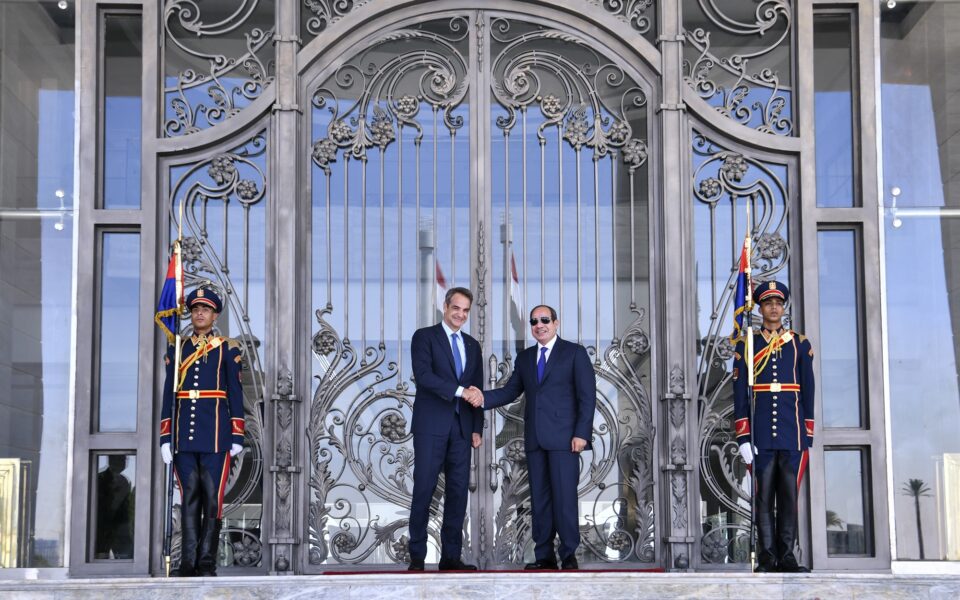On Wednesday Cairo will host an Egyptian-Greek-Cypriot summit, bringing together Egyptian President Abdel Fattah El-Sisi, Greek Prime Minister Kyriakos Mitsotakis, and Cyprus President Nikos Christodoulides. This is the 10th summit of its kind since the launch of the tripartite cooperation mechanism in 2014, which aims to coordinate and cooperate in the Eastern Mediterranean.
The summit is scheduled to address developments in the region, especially the war in the Gaza Strip, developments in Syria, crises in Libya, Sudan and Somalia, and economic cooperation in the field of energy.
While the summit appears to be a scheduled meeting aimed at enhancing cooperation and coordination in various fields and strengthening relations, it goes beyond a routine annual meeting.
Cairo’s messages
In the world of politics, timing is everything, and it cannot be ignored that the summit came after the rapprochement between Egypt and Turkey, which was embodied in two consecutive visits by Turkish President Recep Tayyip Erdogan to Egypt (September and December 2024), and after the recent developments in Syria and Turkish moves there, which raised Cairo’s concerns. It seems that Cairo wants to send several messages via this summit.
The first message is to confirm that the rapprochement between Egypt and Turkey will not come at the expense of the alliance between Egypt, Greece and Cyprus, which is based on mutual trust and respect, while estimates in Egypt described the Egyptian-Turkish rapprochement as stemming from common interests.
Member of the Egyptian Council for Foreign Affairs Ambassador Ahmed Rakha Hassan said that the newly restored Egyptian-Turkish relations focus more on economic aspects, and that Egypt will not favor relations with Turkey over those with Cyprus and Greece, explaining that the rapprochement between Turkey and Egypt is to avoid escalation and not exacerbate matters. For Cairo, the mending of relations with Turkey is beneficial for several reasons, including the Libyan file and the issues of the Horn of Africa and the Red Sea, all of which are regions witnessing a certain Turkish presence or influence.
The second message from Egypt concerns the situation in the Eastern Mediterranean, and Cairo understands Athens’ concerns about the possibility of future cooperation between Turkey and Egypt.
Egypt cannot reach an agreement with Turkey on the demarcation of maritime borders in the Eastern Mediterranean due to the lack of an actual or internationally recognized line of communication in the Mediterranean between the two countries, while Egyptian sources confirmed that the two sides (Egypt and Turkey) may be able to reach other maritime agreements, but after Turkey resolves its problems with Cyprus and Greece.
Egypt and Greece signed a maritime border demarcation agreement in 2020, and under the agreement, the two countries confront illegal Turkish movements in the Mediterranean.
The third message from Cairo is directed to Turkey, and aims to implicitly respond to the recent Turkish developments with Syria regarding the demarcation of maritime borders in the Mediterranean, which worries Cairo, Athens and Nicosia.
A source at the Egyptian Ministry of Petroleum said that Turkey’s efforts to demarcate maritime borders in the Eastern Mediterranean are a kind of “economic warfare” and an attempt to control areas believed to contain rich gas and oil reserves, especially in the Levant Basin and the Eastern Mediterranean, which reinforces Turkish ambitions.
Cairo’s concerns and goals
Cairo’s concerns about Turkish penetration into Syria are evident, as well as the repercussions of Islamists coming to power in Syria after the fall of Bashar al-Assad’s regime, due to Egypt’s experience with the Muslim Brotherhood and the “red lines” that have been crossed in light of recent developments. Cairo believes that the changes in Syria are reflected in geopolitical balances and open the door for Turkey to become the strongest ally of the new Syrian regime, which reinforces Erdogan’s expansionist desire in the region.
Egypt has not announced any official direction in support of or opposition to the new regime in Syria, but looking at the Egyptian media, it is easy to see the violent campaigns targeting the new regime in Syria led by Ahmed al-Sharaa (Abu Muhammad al-Gulani). Egypt, under Abdel Fattah al-Sisi, still classifies the Muslim Brotherhood as a terrorist movement, and the authorities have not eased their grip on the movement, and the return of Islamists to Syria with Turkish support is a source of concern in Cairo.
Cairo’s goals can be explained by Egypt’s efforts to strengthen its position in the region, while its relations with Greece and Cyprus form an essential and fundamental part of its relations with Europe. Cairo is expected to try to play a broader role by trying to bring the views of Ankara, Athens and Nicosia closer together. Cairo hopes that the Egyptian-Turkish rapprochement will be one of the main factors that motivate Turkey to engage in the East Mediterranean Gas Forum, which will play a major role in supporting stability in the region.
The new arrangement may represent an opportunity for Greece to promote a trilateral initiative aimed at enhancing dialogue and cooperation between Greece, Egypt and Turkey. Greece may have an opportunity to intervene in the relationship between Egypt and Turkey.
Sara Sherif is a journalist and foreign affairs analyst based in Cairo.
